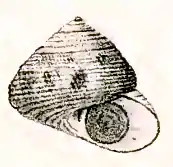| Chlorodiloma millelineata | |
|---|---|
 | |
| Drawing with an apertural view of a shell of Chlorodiloma millelineata | |
| Scientific classification | |
| Domain: | Eukaryota |
| Kingdom: | Animalia |
| Phylum: | Mollusca |
| Class: | Gastropoda |
| Subclass: | Vetigastropoda |
| Order: | Trochida |
| Superfamily: | Trochoidea |
| Family: | Trochidae |
| Genus: | Chlorodiloma |
| Species: | C. millelineata |
| Binomial name | |
| Chlorodiloma millelineata (Bonnet, 1864) [1] | |
| Synonyms | |
| |
Chlorodiloma millelineata is a species of sea snail, a marine gastropod mollusk in the family Trochidae, the top snails.[2][3]
Description
The height of the shell attains 19 mm, its diameter 21 mm. The thick shell has a very deep umbilicus, nearly reaching to the apex. It is a little shining, yellowish, with elongated flexuous unequal brownish-green spots and dots of the same color. The acute spire is little elevated. The 6 whorls are obliquely striate. The body whorl is very large and contains numerous irregular spiral ridges, stronger and numbering 6 on the base, with obliquely striate interstices. The oblique aperture is rounded, nacreous with greenish reflections and showing the folds inside.[4]
Distribution
This marine species is endemic to Australia and occurs in the Torres Straits and off Queensland.
References
- ↑ Bonnet, A. 1864. Coquilles nouvelles ou peu connues: Acantina delorioli, Bulimus wairgeirensis, Planorbis sinuosus, Littorina aurea, Trochus millelineata, Conus rubescens. Revue et Magasin de Zoologie Pure et Appliquée 1864, XVI: 279-282
- ↑ Bouchet, P. (2012). Chlorodiloma millelineata (Bonnet, 1864). Accessed through: World Register of Marine Species at http://www.marinespecies.org/aphia.php?p=taxdetails&id=546914 on 2012-11-23
- ↑ Donald K.M., Kennedy M. & Spencer H.G. (2005) The phylogeny and taxonomy of austral monodontine topshells (Mollusca: Gastropoda: Trochidae), inferred from DNA sequences. Molecular Phylogenetics and Evolution 37: 474-483.
- ↑ Tryon (1889), Manual of Conchology XI, Academy of Natural Sciences, Philadelphia (described as Trochus millelineatus)